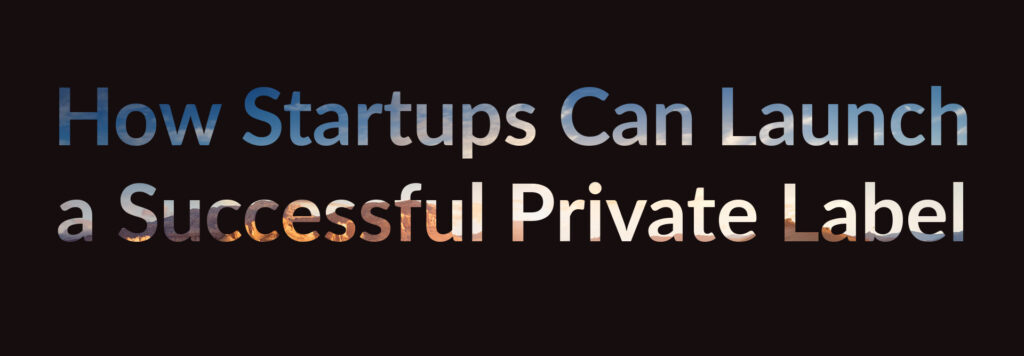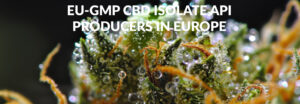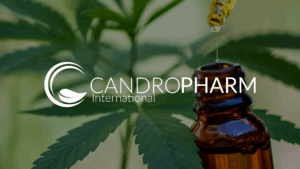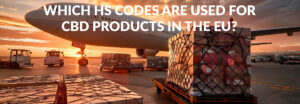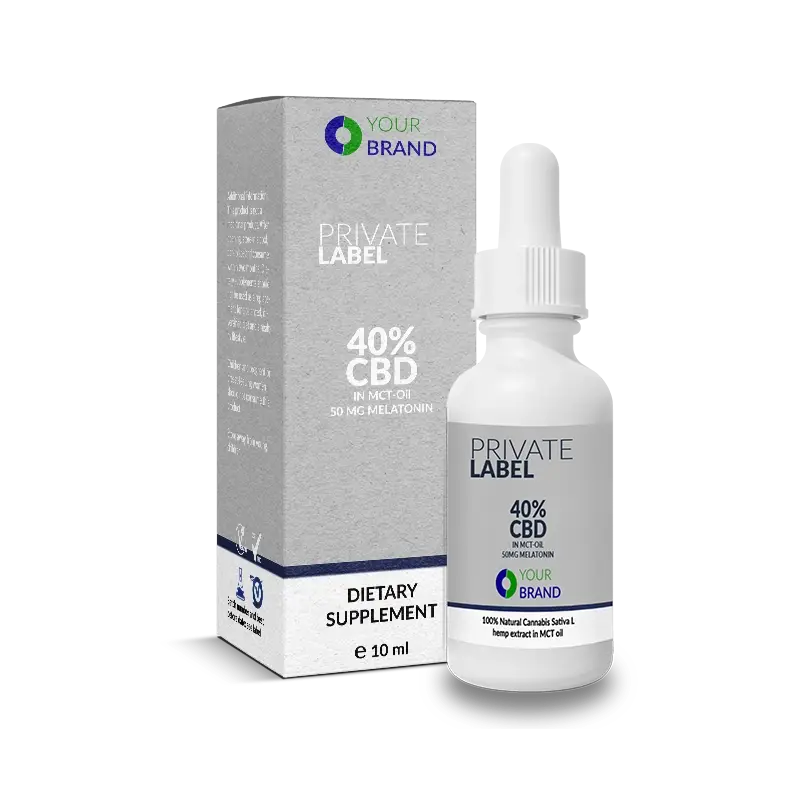How Startups Can Launch a Successful Private Label CBD Line
A Step-by-Step Guide
The CBD market offers tremendous opportunities for startups, but entering this space can feel overwhelming without the right strategy. Private labeling provides a streamlined path to launch CBD products without the massive upfront costs of manufacturing facilities or extensive product development. Successful startups can enter the CBD market quickly by partnering with established manufacturers while focusing their resources on branding, compliance, and customer acquisition.
Smart entrepreneurs recognize that private labeling eliminates many traditional barriers to entry in the CBD industry. Instead of spending months or years developing formulations and securing manufacturing capabilities, startups can select proven products and customize them with their own branding and packaging. This approach allows new companies to compete effectively while maintaining quality standards and regulatory compliance.
The key to success lies in understanding the unique challenges of the CBD market, from navigating complex regulations to building consumer trust in a crowded marketplace. Startups that master the fundamentals of manufacturer selection, brand development, and compliant marketing strategies position themselves for sustainable growth in this rapidly expanding industry.
Key Takeaways
- Private labeling allows startups to launch CBD products quickly without manufacturing infrastructure or extensive product development costs
- Success depends on choosing compliant manufacturers with proper certifications and building a distinctive brand that resonates with target customers
- Effective marketing requires focusing on organic strategies and relationship building due to advertising restrictions on major platforms
Understanding the Private Label CBD Industry
The CBD industry has grown rapidly in recent years, creating new opportunities for entrepreneurs to enter this expanding market. Private label CBD products offer startups a way to launch their own branded products without the costs and complexity of manufacturing.
Overview of the CBD Industry Landscape
The CBD market reached significant size following the 2018 Farm Bill, which legalized hemp-derived CBD products containing less than 0.3% THC. This federal change opened doors for businesses across the United States.
- The CBD industry generates billions in annual revenue
- Growth continues across multiple product categories
- Consumer acceptance has increased steadily
The market includes several key product types:
| Product Category | Examples |
|---|---|
| Topicals | Creams, balms, lotions |
| Edibles | Gummies, chocolates, beverages |
| Tinctures | Oils, drops, sprays |
| Capsules | Softgels, tablets |
State regulations vary widely across the country. Some states allow all hemp-derived products, while others maintain stricter rules or partial bans.
The CBD industry landscape includes established manufacturers, emerging brands, and retail channels ranging from online stores to physical dispensaries.
Key Trends in the CBD Market
Several important trends shape the current CBD market. Consumer education has improved, leading to more informed purchasing decisions.
Product Innovation:
- Companies develop targeted formulations for specific needs
- Combination products blend CBD with other wellness ingredients
- New delivery methods continue to emerge
Quality standards have become more important to consumers. Third-party lab testing and certificates of analysis (COAs) are now expected rather than optional.
The wellness angle drives much of the market growth. Consumers seek natural alternatives for stress management, sleep support, and general wellness.
Regulatory Evolution:
- States continue updating their CBD laws
- FDA guidance remains limited but evolving
- Industry self-regulation has increased
CBD market trends show consumers prefer brands that provide transparency about sourcing, testing, and ingredients.
Benefits of Private Label CBD Products
Private label CBD products offer startups several advantages over creating products from scratch. The most significant benefit is reduced time to market.
Cost Advantages:
- Lower initial investment compared to manufacturing
- No need for expensive equipment or facilities
- Reduced research and development costs
Private label CBD products allow entrepreneurs to focus on branding and marketing rather than product development.
Quality control becomes simpler when working with established manufacturers. These companies already have testing protocols, certifications, and regulatory compliance systems in place.
Customization Options:
- Custom packaging and labeling
- Brand-specific formulations
- Flexible order quantities
The private label model lets startups test market demand without major upfront commitments. They can adjust product lines based on customer feedback and sales data.
Manufacturing partnerships provide access to expertise that would take years to develop internally. This includes knowledge of extraction methods, formulation techniques, and regulatory requirements.
Planning Your Private Label CBD Brand
Successful CBD brands begin with thorough market research and strategic positioning. Understanding CBD regulations and identifying your target audience forms the foundation for selecting the right niche and developing a distinctive brand identity.
Market Research and Target Audience Analysis
Market research reveals key insights about the CBD market landscape. Entrepreneurs should analyze current trends, pricing structures, and consumer preferences across different CBD product categories.
Target Audience Demographics:
- Age groups (18-35, 36-50, 50+)
- Income levels and spending habits
- Health and wellness priorities
- Product preference patterns
Understanding consumer behavior helps identify gaps in the market. Some customers prefer full-spectrum products while others seek isolate-based options. Pain management users have different needs than sleep aid seekers.
Competitor analysis provides valuable insights into successful positioning strategies. Startups should examine existing CBD brands’ pricing, marketing messages, and product offerings.
Survey data and focus groups reveal specific customer pain points. This information guides product development and marketing strategies for private label CBD products.
Selecting a CBD Niche
Niche selection determines product focus and market positioning. Popular CBD niches include wellness, fitness, beauty, pet care, and sleep support categories.
High-Demand CBD Product Categories:
- Tinctures and oils
- Gummies and edibles
- Topical creams and balms
- Pet products
- Sleep and relaxation aids
Wellness-focused brands often target stress relief and daily health maintenance. Fitness niches emphasize recovery and performance enhancement benefits.
Beauty and skincare represent growing segments within the CBD market. These products appeal to consumers seeking natural skincare solutions.
Pet CBD products serve a dedicated customer base willing to pay premium prices. This niche requires specific formulations and dosing considerations.
Sleep and relaxation products target consumers with specific health concerns. These customers often show higher brand loyalty and repeat purchase rates.
Defining Your Brand Identity
Brand identity encompasses visual elements, messaging, and brand personality. Strong CBD brands communicate clear value propositions that resonate with target customers.
Core Brand Elements:
- Logo and color scheme
- Brand voice and messaging
- Packaging design
- Website aesthetic
Creating a unique brand identity helps differentiate products in competitive markets. Brands should reflect their target audience’s values and preferences.
Premium brands emphasize quality, purity, and third-party testing. Budget-conscious brands focus on value and accessibility.
Lifestyle brands integrate CBD into broader wellness narratives. These brands often feature customer testimonials and educational content.
Brand consistency across all touchpoints builds recognition and trust. Packaging, website design, and marketing materials should maintain cohesive visual identity.
Messaging should address specific customer needs and concerns. Clear communication about product benefits and usage instructions builds consumer confidence.
Legal and Regulatory Considerations
CBD businesses must navigate complex licensing requirements, obtain proper federal tax identification, and comply with strict labeling laws that vary by state and product type.
Licensing and Compliance Requirements
CBD companies face a complex web of federal, state, and local licensing requirements. The FDA regulates CBD products under specific guidelines that restrict health claims and require compliance with Good Manufacturing Practices.
Most states require cannabis business licenses even for hemp-derived CBD products. These licenses can cost thousands of dollars and require extensive background checks. Some states mandate separate licenses for manufacturing, distribution, and retail operations.
Key licensing requirements include:
- State cannabis business license
- Manufacturing facility permits
- Third-party lab testing certifications
- Product registration with state agencies
Private label companies must adhere to intellectual property, labeling requirements, and product safety standards. CBD businesses face additional scrutiny due to the evolving regulatory landscape.
Payment processing presents unique challenges. Many traditional processors refuse CBD transactions, forcing companies to work with specialized high-risk merchant services.
Registering Your CBD Company and Obtaining an EIN
Every CBD company must register as a legal business entity and obtain an Employer Identification Number (EIN) from the IRS. This federal tax ID number is essential for banking, tax filing, and business operations.
Business structure options include:
| Entity Type | Tax Treatment | Liability Protection |
|---|---|---|
| LLC | Pass-through | Limited |
| Corporation | Double taxation | Full |
| S-Corporation | Pass-through | Full |
The EIN application process is free through the IRS website. CBD companies should avoid third-party services that charge fees for this basic requirement.
State registration requirements vary significantly. Some states require additional cannabis-specific registrations beyond standard business formation. Companies must research their specific state requirements before beginning operations.
Banking remains challenging for CBD businesses. Most banks require proof of legal compliance and may still refuse services despite proper documentation.
Understanding Labeling and Packaging Laws
CBD product labeling must comply with both FDA regulations and state-specific requirements. Proper labeling and packaging must meet regulatory guidelines to prevent legal consequences.
Required label elements typically include:
- Product name and ingredients
- Net weight or volume
- Manufacturer information
- Batch or lot numbers
- Third-party lab test results
Health claims are heavily restricted. Companies cannot claim their CBD products diagnose, treat, cure, or prevent any disease. Even wellness claims require careful legal review.
Child-resistant packaging is mandatory in many states. Some jurisdictions require opaque containers that prevent product visibility. Package sizes may be limited by state regulations.
QR codes linking to Certificates of Analysis have become standard practice. These provide transparency about product potency and purity testing results.
State-specific warnings and symbols may be required. California requires Proposition 65 warnings, while other states mandate cannabis-specific labeling elements.
Finding and Working with a Manufacturing Partner
Choosing the right manufacturing partner determines the quality and success of private label CBD products. The evaluation process involves checking certifications, testing capabilities, and production capacity while negotiating fair terms for custom formulations.
Evaluating Potential CBD Manufacturing Partners
CBD manufacturers must hold specific certifications to produce legal products. Look for companies with FDA-registered facilities and Good Manufacturing Practices (GMP) certification. These standards ensure quality control and regulatory compliance.
Third-party testing capabilities are essential for CBD products. The manufacturing partner should provide Certificate of Analysis (COA) documents for every batch. This testing covers potency, pesticides, heavy metals, and microbials.
Production capacity affects order fulfillment and scaling. Finding the right manufacturer requires assessing their ability to handle initial orders and future growth. Request information about minimum order quantities and lead times.
Key evaluation criteria include:
- Current CBD product portfolio
- Years of experience in CBD manufacturing
- Available extraction methods (CO2, ethanol, distillation)
- Packaging and labeling services
- Customer references and reviews
Financial stability matters for long-term partnerships. Request financial statements or credit reports to verify the manufacturer can fulfill contracts consistently.
Customizing Product Formulations
CBD product formulations require precise cannabinoid profiles and carrier ingredients. Manufacturers should offer options for full-spectrum, broad-spectrum, or isolate-based products. Each type provides different effects and legal considerations.
Carrier oils affect absorption and taste in CBD products. Common options include MCT oil, hemp seed oil, and olive oil. The manufacturing partner should explain how each carrier impacts the final product.
Dosage customization allows brands to target specific markets. Products can range from 5mg to 50mg per serving depending on the intended use. The manufacturer should provide stability testing for custom dosages.
Customization options typically include:
- Cannabinoid ratios (CBD, CBG, CBN)
- Flavoring systems (natural or artificial)
- Product formats (oils, gummies, capsules)
- Packaging sizes and materials
Formula development timelines vary by complexity. Simple CBD oil formulations may take 2-4 weeks while complex edibles require 6-8 weeks of development and testing.
Negotiating Contracts and Production Terms
Minimum order quantities (MOQs) impact startup cash flow and inventory management. CBD manufacturers typically require 500-5000 units per SKU. Negotiating terms should focus on reasonable MOQs that match business projections.
Payment terms affect working capital requirements. Standard terms include 50% deposit with 50% upon completion. Some manufacturers offer net-30 payment terms for established relationships.
Quality control procedures must be clearly defined in contracts. This includes testing protocols, rejection criteria, and remediation processes for failed batches. The contract should specify who pays for retesting and rework.
Critical contract elements:
- Pricing structure and volume discounts
- Intellectual property protection
- Delivery schedules and penalties
- Force majeure clauses
- Termination conditions
Lead times for CBD products range from 4-12 weeks depending on complexity. The contract should include realistic timelines with buffer periods for testing and potential delays.
Exclusivity agreements prevent manufacturers from producing similar products for competitors. This protection may cost 10-20% premium but provides market advantage for unique formulations.
Building and Launching Your Product Line
Creating a successful private label CBD product line requires careful attention to packaging design, rigorous quality testing, and strategic product selection. These three elements work together to establish credibility and drive initial sales in the competitive CBD market.
Designing Distinctive Packaging
Packaging serves as the first point of contact between consumers and private label CBD products. Eye-catching design elements help CBD brands stand out on crowded shelves and build instant recognition.
Color Psychology and Brand Identity
- Dark colors (navy, forest green) convey premium quality
- Earth tones suggest natural, organic ingredients
- Bright accents create shelf appeal without appearing unprofessional
The packaging must clearly display required regulatory information. This includes CBD content per serving, batch numbers, and third-party lab testing QR codes.
Materials and Sustainability Child-resistant packaging remains mandatory for most CBD products. Glass containers appeal to premium market segments, while recyclable plastics reduce costs for mass market positioning.
Building your brand identity requires consistent visual elements across all product variations. Typography, logo placement, and color schemes should remain uniform throughout the entire product line.
Ensuring Product Quality and Testing
Quality control separates successful CBD brands from failed ventures. Third-party testing provides the credibility needed to build consumer trust in private label CBD products.
Testing Requirements
- Potency verification for CBD and THC levels
- Pesticide and heavy metal screening
- Microbial contamination analysis
- Residual solvent testing
Each batch requires individual testing before release. Certificates of Analysis (COAs) should be easily accessible through QR codes or website portals.
Manufacturing Partner Selection Established manufacturers with Good Manufacturing Practice (GMP) certification reduce quality risks. They maintain consistent processes and documentation standards required for regulatory compliance.
Choosing the right products means partnering with manufacturers who prioritize quality control. Request facility audits and review their standard operating procedures before committing to partnerships.
Starting with a Focused SKU Strategy
New CBD brands benefit from launching with 3-5 carefully selected products rather than extensive product lines. This approach allows better inventory management and focused marketing efforts.
Product Selection Criteria
| Product Type | Market Demand | Profit Margin | Regulatory Complexity |
|---|---|---|---|
| Tinctures | High | Medium | Low |
| Topicals | Medium | High | Low |
| Edibles | High | Low | High |
| Capsules | Medium | Medium | Medium |
Focus on products with proven market demand and manageable regulatory requirements. Tinctures and topicals often provide the best starting point for new private label CBD products.
Market Testing Strategy Launch products in limited geographic regions first. This allows brands to gather customer feedback and refine formulations before wider distribution.
Monitor sales data and customer reviews closely during the first 90 days. Successful products can be scaled up while underperforming items are discontinued or reformulated.
Effective Marketing and Growth Strategies
A strong marketing foundation combined with targeted growth tactics determines whether CBD startups succeed or fail in this competitive market. Smart positioning and digital outreach help new brands capture market share while building lasting customer relationships.
Crafting a Compelling Go-to-Market Plan
CBD startups need a focused launch strategy that addresses their specific target audience and market position. The plan should identify key customer segments, pricing strategies, and distribution channels before product launch.
Market research reveals customer pain points that CBD products can solve. Startups should focus on specific benefits like sleep improvement, stress relief, or workout recovery rather than general wellness claims.
Key Go-to-Market Elements:
- Target customer demographics and psychographics
- Competitive pricing analysis
- Distribution channel selection
- Launch timeline and milestones
Product positioning must differentiate the brand from established competitors. New CBD companies can succeed by targeting underserved niches or offering unique formulations that larger brands ignore.
Partnership opportunities with complementary businesses accelerate market entry. Wellness centers, yoga studios, and health food stores provide natural distribution channels for CBD products.
Digital Marketing and Brand Promotion
Private label marketing strategies focus on building brand recognition through consistent messaging across all digital platforms. CBD brands must navigate advertising restrictions while creating engaging content that educates consumers.
Content marketing drives organic traffic and builds trust with potential customers. Educational blog posts, ingredient explanations, and usage guides help consumers understand CBD benefits without making medical claims.
Effective Digital Channels:
- Email marketing campaigns
- Social media content (Instagram, TikTok)
- Influencer partnerships
- SEO-optimized website content
Search engine optimization targets CBD-related keywords that potential customers use when researching products. Long-tail keywords like “best CBD for sleep” or “organic CBD gummies” attract qualified traffic.
Social media marketing requires careful platform selection since many restrict CBD advertising. Instagram and TikTok allow organic content about CBD lifestyle and education while prohibiting direct product promotion.
Scaling Within the CBD Market
Growth strategies for private label brands help CBD companies expand their product lines and market reach systematically. Successful scaling requires operational efficiency and strategic product development.
Product line expansion should build on existing customer preferences and market feedback. CBD brands can introduce new formats, strengths, or flavors based on customer requests and sales data.
Scaling Priorities:
- Manufacturing capacity increases
- New product development
- Geographic market expansion
- Retail partnership growth
The CBD market continues evolving with changing regulations and consumer preferences. Successful brands monitor industry trends and adapt their strategies to maintain competitive advantages.
Data-driven decision making guides expansion efforts through sales analytics and customer feedback. CBD companies should track conversion rates, customer lifetime value, and product performance metrics to optimize growth investments.
Frequently Asked Questions
Starting a private label CBD business involves navigating complex regulations, finding reliable suppliers, and building a brand that stands out in a competitive market. These common questions address the most important challenges new CBD entrepreneurs face.
What are the critical steps involved in developing a private label CBD product line for a startup?
Startups must first obtain proper business licensing and reseller permits before they can legally sell CBD products. The licensing requirements vary by state and location.
Product selection comes next. Entrepreneurs should choose from oils, edibles, topicals, or other CBD formats based on market demand and their target audience preferences.
Finding a reliable private label manufacturer is essential. Companies like Private Label Hemp Lab produce products in FDA-registered facilities to ensure quality and compliance.
Branding and packaging design must reflect the company’s values while meeting legal labeling requirements. This includes displaying product volume, active CBD per serving, and ingredient lists.
Which regulatory compliance aspects must startups consider before launching a CBD product line?
All hemp-derived CBD products must contain no more than 0.3% THC to comply with the 2018 Farm Bill. This federal requirement applies to every product in the line.
Startups need both a business license and often a reseller license to operate legally. These licenses ensure companies can sell CBD products and purchase wholesale without paying sales tax.
Product labeling must include specific information like total volume, CBD content per serving, and complete ingredient lists. Companies cannot make unverified health claims about their products.
Third-party lab testing provides certificates of analysis that verify product potency and purity. This documentation helps prove compliance with regulations.
How can startups effectively research and identify their target market for CBD products?
Market research begins with analyzing current CBD industry trends and consumer preferences. Startups should identify whether their audience prefers oils, edibles, topicals, or other product formats.
Demographics play a major role in product positioning. Age groups, income levels, and lifestyle preferences influence which CBD products consumers choose.
Competitor analysis reveals gaps in the market that startups can fill. This includes studying pricing strategies, product offerings, and marketing approaches of existing brands.
Consumer surveys and focus groups provide direct feedback about product preferences and purchasing decisions. This data helps startups refine their product line before launch.
What are the best practices for sourcing high-quality hemp and CBD extracts for private labeling?
Startups should partner with manufacturers who grow hemp organically and provide full traceability from seed to shelf. This ensures product quality and appeals to health-conscious consumers.
Third-party lab testing is non-negotiable for quality assurance. Reputable suppliers provide certificates of analysis that verify cannabinoid content and test for pesticides, heavy metals, and solvents.
FDA-registered facilities offer additional quality guarantees. Private label manufacturers operating in these facilities follow strict production standards and documentation requirements.
Supply chain transparency allows startups to verify their products’ origins and manufacturing processes. This information builds consumer trust and supports marketing claims.
How should startups approach branding and marketing for their private label CBD products?
Brand identity must differentiate the company from competitors while appealing to the target market. This includes logo design, packaging aesthetics, and brand messaging that reflects company values.
Digital marketing channels like social media, email campaigns, and search engine optimization help reach potential customers cost-effectively. These platforms allow startups to build audiences without large advertising budgets.
Content marketing through educational blog posts and social media content establishes expertise and builds trust with potential customers. This approach works well in the CBD industry where consumers seek reliable information.
Compliance with advertising restrictions is crucial. Many platforms have specific rules about CBD product promotion that startups must follow to avoid account suspensions.
What common challenges do startups face in the CBD industry, and how can they overcome them?
Banking and payment processing difficulties affect many CBD businesses. Startups should research CBD-friendly financial institutions and payment processors before launching.
Advertising restrictions on major platforms limit marketing reach. Companies can overcome this by focusing on email marketing, influencer partnerships, and content marketing strategies.
Supply chain complexity requires careful vendor selection and relationship management. Working with established private label manufacturers reduces these operational challenges.
Market saturation makes differentiation difficult. Startups can stand out by focusing on specific niches, offering unique formulations, or providing exceptional customer service that builds loyalty.

